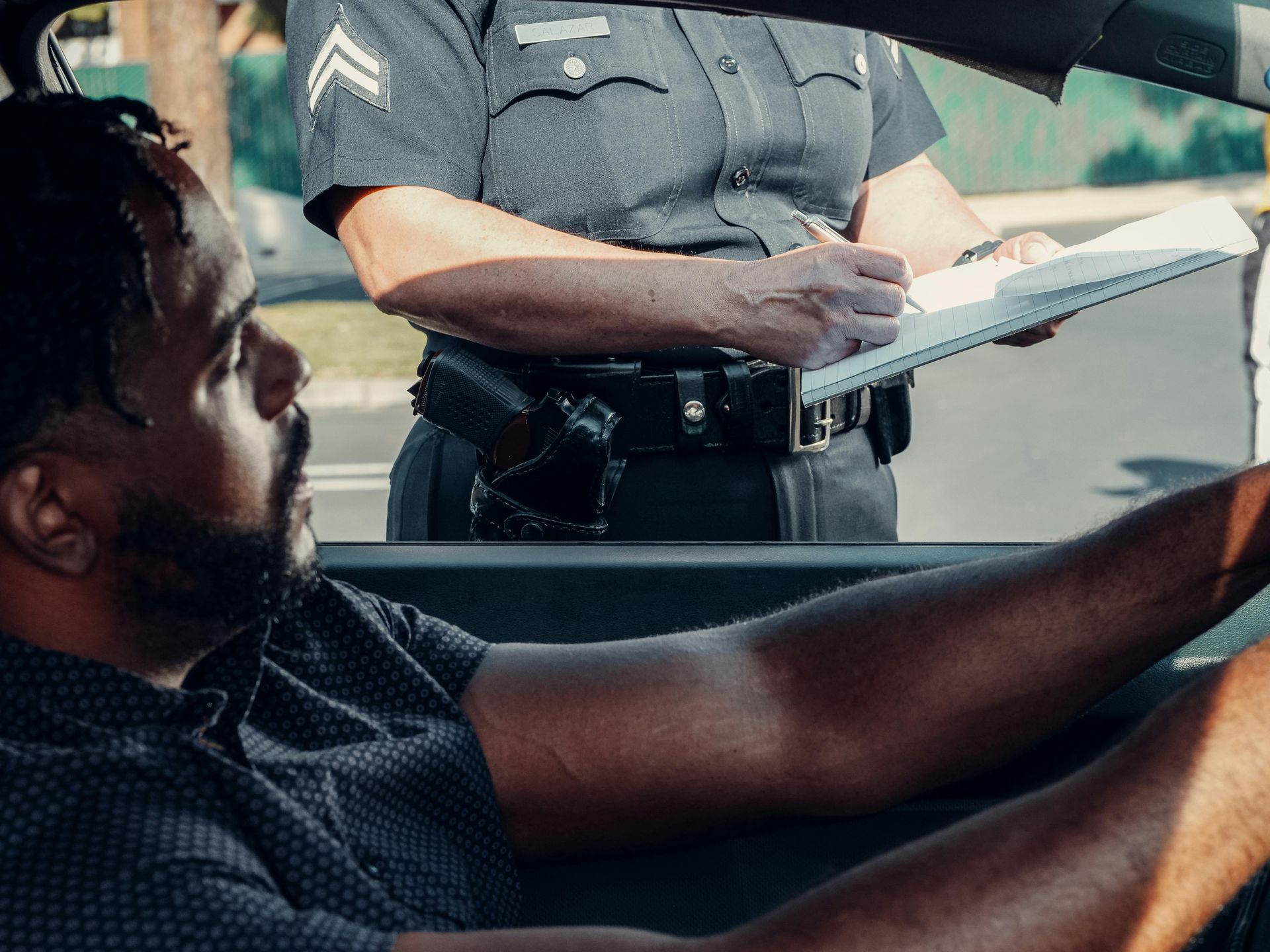“Furtive Movements” and “Training and Experience” – The Vague, Magical Phrases Cops Use to Turn Nothing into Probable Cause
How Courts Let Cops Invent Criminality—and the Constitution Just Nods Along

At police training classes and seminars, particularly training related to traffic stops and narcotics interdictions, they learn about and are taught legal terminology that they incorporate into their probable cause affidavits and testimony to get around the Fourth Amendments protections against unreasonable searches and seizures. Especially when it comes to traffic stops, the two most commonly used phrases are “furtive movements” and “training and experience.”
Part 1-What Is a “Furtive Movement, ”Anyway?
Let’s begin with the basics. "Furtive movement" is a term you'll often hear in courtrooms when officers are asked why they decided to search someone’s car, person, or soul. It’s supposed to describe a movement that connotes concealment or evasion—a suspect hiding something, reaching for something, or behaving in a way that signals intentional secrecy. As the Indiana Court of Appeals described it in B.R. v. State, 162 N.E.3d 1173 (Ind. Ct. App. 2021):
"Neither shaking nor being visibly nervous is 'furtive.' To establish that a suspect has engaged in furtive movements, the act must connote evasion or concealment."
That’s the legal standard. It sounds clear. Objective, even. Like something you could build actual case law on. In theory, it refers to to suspicious, sudden, or concealed actions by a driver or passenger, such as reaching under the seat, leaning toward the center console, or hunching over while during the course of the traffic stop.
In practice, it often means: “The driver looked like he might be hiding something, maybe, and I needed an excuse to search,” and actions such as getting into your glovebox to get your registration before the officer gets to your window, or passengers moving around and looking back towards the cop car that’s pulling them over can be described as “furtive.”
If you’re pulled over in Indiana, here’s the golden rule: don’t move around. Don’t reach. Don’t rummage. Don’t even think about opening the glovebox until the officer asks for your documents. And whatever you do, don’t try to be helpful and have your license and registration ready ahead of time.
Why? Because Indiana courts have all but declared that looking organized is now suspicious.
“Furtive Movements”: The All-Purpose Excuse
Police love to use the phrase “furtive movements” to justify a search. It’s vague, subjective, and conveniently covers just about anything you do with your hands. Reach under your seat? Suspicious. Lean toward the center console? Suspicious. Stretch your arm out with your license before the cop even says hello? Also suspicious—at least according to the Indiana Court of Appeals in Canonge v. State, 218 N.E.3d 620 (Ind. Ct. App. 2023).
Part II: Why It Matters – Furtive Movements as the Gateway Drug to Dog Sniffs and Delays
The magic of the "furtive movement" label is that it doesn’t need to prove guilt. It just needs to create “reasonable suspicion”—the low bar that allows officers to:
- Prolong a traffic stop,
- Call in a canine unit,
- Pull passengers out of the vehicle,
- And in some cases, initiate a full-blown search.
Here’s the rub: The moment “reasonable suspicion” enters the equation, your Fourth Amendment protections begin to fade like an old police report in the sun. A routine traffic stop morphs into an extended roadside investigation based on an officer’s perception of your nervous hands, sideways glance, or—for the love of God—your early attempt to hand over your license.
This is where things turn mystical.
Because courts don't really ask whether you made a furtive movement. They ask whether the officer felt like you did. Enter the judicially adored, rarely scrutinized talisman of:
Part III - Training and Experience”: The Cop’s Magic Wand
Say the words out loud in a suppression hearing—preferably with a solemn tone and a furrowed brow—and suddenly the Fourth Amendment packs up and leaves the courtroom.
Here’s how it works:
- No clear view of contraband?
→ “Based on my training and experience, I believed the subject was hiding drugs.” - No weapon, no threat, no reason?
→ “My training and experience told me the passenger’s body language was evasive.” - No probable cause whatsoever?
→ “In my training and experience, the suspect’s silence confirmed my suspicions.”
That’s right. Silence. Nervousness. Reaching for your wallet. Smoking a cigarette too fast. All of it becomes grounds for search and seizure if an officer invokes the sacred phrase: “based on my training and experience.”
It doesn’t need to be quantified.
It doesn’t need to be explained.
It certainly doesn’t need to be linked to any actual data or reliable methodology.
It just needs to be said—preferably on the record—and voilà:
Your Honor, I waved my wand of vaguely defined professional intuition, and the Constitution melted like a popsicle in July.”
But What Is This “Training,” Anyway?
Great question. You’d think something so legally powerful would have specific contours. Spoiler: it doesn’t.
It could mean:
- A two-day roadside interdiction seminar hosted by a retired state trooper from Alabama.
- Watching enough YouTube videos of cartel busts.
- Sitting through a PowerPoint at roll call that says “backpacks = drugs.”
The courts don’t ask what the training consisted of. They don’t ask who delivered it. They don’t ask whether the officer passed or failed.
They just nod respectfully and say, “Thank you for your service—now go ahead and rummage through that guy’s car.”
Which brings us to:
Part IV - Canonge v. State: When Handing Over Your License Is Probable Cause
Or, How the Indiana Court of Appeals Turned Courtesy Into Criminality
Let’s set the scene: You're driving through Avon, Indiana—land of roundabouts and overzealous policing—when you're pulled over. Like a good little citizen, you reach into your glove box, grab your license and registration, and have it ready for the officer before he waddles up to your window.
Congratulations.
You just triggered reasonable suspicion.
No, seriously. That’s what happened in Canonge v. State, 218 N.E.3d 620 (Ind. Ct. App. 2023), where the Indiana Court of Appeals decided that being prepared during a traffic stop is now “unusual behavior” justifying a prolonged detention and K-9 search.
The “Suspicious” Behavior
Let’s take a quick roll call of what sealed Mr. Canonge’s fate:
- He handed over his license before being asked.
- His passengers looked nervous (you know, like everyone does during a stop).
- One guy didn’t make eye contact.
- Someone smoked a cigarette too quickly.
- There were backpacks on the floorboard (probably where people put backpacks).
- People moved inside the vehicle after police lights came on.
Throw in some vague “furtive movements” and voila!—you’ve got the makings of a full-blown drug operation, or at least enough for the court of appeals nod along like it all makes sense. And what were those furtive movements? As the dissent noted:
“Even though Officer Roach answered affirmatively when asked if he saw "furtive movements," Officer Roach clarified that what he saw was the occupants' "bodies were moving" and he assumed they were reaching for something. He could not see the occupants' hands, and thus, he did not actually observe them concealing anything.”
Enter the Dog
Naturally, instead of issuing a traffic warning and sending Mr. Canonge on his way, Officer Roach decided it was time to phone a friend—with four legs.
While waiting 20+ minutes for the K-9 unit to arrive, Officer Roach passed the time pretending to write a warning ticket. Not because he intended to issue one. No, no. He said—under oath, mind you—that he was just “occupying time” until the dog got there.
You read that right. Writing the ticket wasn’t part of the stop’s purpose—it was part of the cover story.
And the Court? Totally fine with it. Nothing to see here, folks.
But Wait—Isn’t This All Just a “Hunch”?
You’d think so. In fact, the officer in Canonge admitted he didn’t actually see what the occupants were reaching for. Just that they were “moving.”
In legalese, that’s called
speculation.
The majority embraced this with open arms, citing the officer’s "500 prior stops" as if Fourth Amendment analysis is just a numbers game: “He’s done this a lot, therefore he must be right.”
Meanwhile, Judge May’s dissent cut through the nonsense with surgical precision:
A Ray of Sanity: The Dissent
Thankfully, Judge May brought a fire extinguisher to this dumpster fire of an opinion. In dissent, she wrote:
“I see absolutely nothing suspicious in a motorist having ready the documents the motorist knows the officer is going to request for inspection.”
This, folks, is called common sense—a term that’s been placed on the endangered species list in appellate courts across America.
Judge May also noted (correctly) that reaching around in your own car isn’t illegal, and that the officer didn’t actually see anyone hiding drugs—he just assumed they were. Because assumptions are all you need when the majority’s standard for reasonable suspicion is now somewhere between “pre-crime” and “bad vibes.”
The Real Lesson
The moral of Canonge isn’t legal—it’s psychological:
- Don’t be too calm.
- Don’t be too nervous.
- Don’t move.
- Don’t sit still.
- Don’t hand over your license early.
- But also don’t fumble for it.
- And whatever you do, don’t have a backpack, a cigarette, or a minor in your backseat.
Otherwise, congratulations: you are now a threat to public safety.
Why This Case Matters
Because Canonge isn't just absurd—it's dangerous.
It signals to law enforcement that literally any behavior, even compliance, can be spun into suspicion. And once you cross that threshold, your constitutional rights evaporate faster than a police dog’s certification paperwork.
The Fourth Amendment is supposed to protect you from this kind of arbitrary intrusion. But decisions like Canonge twist that protection into a Rorschach test—what matters isn’t what you did, but how the officer felt about it afterward.
And what did the Indiana Supreme Court do when asked to review this farce?
Denied transfer.
Because apparently, it's not absurd enough.
No need to weigh in when the lower courts are already doing such a bang-up job defining “suspicion” as any combination of:
- Document readiness,
- Inward breathing,
- And not spontaneously combusting on the roadside.
Final Thought
If you still believe the Constitution protects you during a traffic stop, Canonge should disabuse you of that quaint notion. We’ve officially reached the point where being polite to police is de facto criminal behavior.
So next time you’re pulled over? Don’t move. Don’t speak. Don’t blink. Just wait silently for your turn to be sniffed.
Welcome to Indiana.
This blog post is for informational and educational purposes only. It does not constitute legal advice, nor does it create an attorney-client relationship. The views and opinions expressed herein are those of the author and do not necessarily reflect the views of Bjjohnsonlaw.com r or any affiliated individuals. If you are facing legal charges or have specific questions about your rights, you should consult with a licensed attorney familiar with the laws of your jurisdiction.

